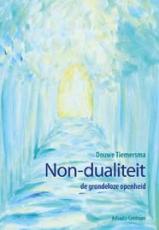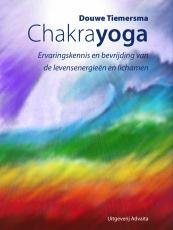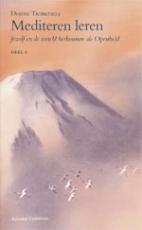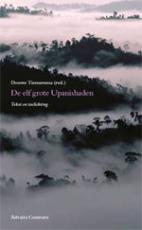2-4 Boeddhistische Omroepstichting - Towards the Openness
jaargang 2 nr. 4 (30 januari 2001)
Boeddhistische Omroepstichting
Het is verheugend dat de boeddhistische visie ook op radio en TV een ruimere plaats krijgt. Het Commissariaat voor de Media had eerst de aanvraag afgewezen, omdat het de boeddhistische aanhang niet goed kon beoordelen. Wie is nu boeddhist? Moet je allen meetellen die aan boeddhistische meditatiegroepen meedoen?
Eigenlijk is deze vaagheid erg positief. Nu wordt 'het boeddhisme' als de zoveelste zuil op de kaart gezet. De gelederen moeten zich sluiten. Iedereen in een hokje, terwijl steeds minder mensen in een hokje opgesloten willen zitten.
Jammer.
"BOS hoopt vooroordelen tegen boeddhisten weg te nemen", zo luidt de kop in de 'Koördanser" (feb. 2001). Maar, de vooroordelen worden voorlopig alleen maar versterkt, als in de eerste uitzending op 28 januari de Tibetaanse monnik uit Emst, Geshe Sonam Gyaltsen, de platte karma-theorie verkondigt, dat Afrikanen hun armoede danken aan negatief karma.
Jammer.
Towards the Openness
Eind 2000 verscheen de Engelse vertaling van Naar de Openheid (Mirananda 1983). De vertaling lag al een aantal jaren klaar, maar nu kon ze door Stichting Openheid worden uitgegeven. Een paar mensen uit California, met oude connecties in Nederland, hebben de vertaling verzorgd: Frank Anderson en Robert Powell. De laatste kennen sommigen van zijn boeken, o.a. The blissful life, as realized through the teachings of Sri Nisargadatta Maharaj, The great awakening. Reflections on Zen and reality, Discovering the realm beyond appearance. Leo Terlouw heeft het meeste werk van de opmaak gedaan.
Om een idee te krijgen, is een hoofdstukje als bijlage toegevoegd. Hier een enkel poëtisch tekstje.
Also on the little trail through the water
the wind blows to and fro
with ripplings and rushing in the elms;
I see myself standing there below.
Many images are awakened
of myself as a playing child,
as a painter, bicyclist and thinker;
as clouds they go with the wind.
Allimages have disappeared;
as before, the sky is bright,
the water smooth and sundrenched;
now, I and everything are One: Light.
Literatuur Database
De voorbeeld-database in MSWord, die een tijdje geleden is rondgestuurd, bleek niet te voldoen. De volgende regeling is waarschijnlijk gemakkelijker. a) Degenen die Access kunnen gebruiken, krijgen hierbij een voorbeeld-database waarin ze de literatuur kunnen invullen (zie Bijlage). Kopieën zijn gemakkelijk via email op te sturen. b) Anderen kunnen literatuurlijsten in Word of WP maken. De studentassistent zal de informatie dan in het grote Accesbestand brengen. Dat geldt ook voor de samenvattingen, korte aanduidingen van inhoud, etc. We houden ons aanbevolen.
Literatuur
Leaman, Oliver Eastern Philosophy. Key Readings, Routledge, London 2000, xvi+305 blz., ISBN 0-415-17358-2, f 49,95
Dit boekje is uitgekomen in de serie 'Routledge Key Guides'. De achterflap vermeld het volgende.
Eastern Philosophy: Key Readings draws together extracts from a wide range of primary and secondary sources, which cover the many branches of Eastern philosophy and religion. Quotations are arranged under concept headings, and open up the debates on topics such as Zen, yin-yang and Daoism, as well as offering an overview of Eastern philosophical perspectives on subjects such as happiness, war and imagination.
Material js drawn not only from such cornerstone texts as the Bhagavad Gita and the I Ching, but also from modern writings on Eastern philosophy and religion. Extracts are prefaced by Oliver Leaman's succinct [very short] introductions, and supplemented by a glossary of terms, all of which make this a unique and accessible way into a fascinating discipline.
Oliver Leaman is Professor of Philosophy at Liverpool John Moores University. He is the author of Key Concepts in Eastern Philosophy.
Om een indruk te geven van de thema's, waarover één of enkele teksten (van gemiddeld 1 pagina) zijn opgenomen, zijn dit degene die met een A beginnen: Abhidharma, action, Advaita/Advaita Vedanta, afterlife, ahimsa, amida, analysis, anatman/ anatta, ascetism, atman, atomism, avatar.
De geleverde teksten komen alle uit goede literatuur en zijn de moeite van het lezen waard. Het gebied dat bestreken wordt is echter erg ruim - ook de Islamfilosofie is opgenomen. De keuze van de thema's en van een enkele tekst, of hier en daar een paar teksten, over een wereld aan problematiek, kan daarom niet anders dan willekeurig en erg fragmentarisch zijn. Voor beginners zijn vele teksten niet zomaar te begrijpen, omdat er niet-uitgelegde technische termen worden gebruikt. Voor degenen die een zekere kennis van de Oosterse filosofie hebben kan het boek nuttig zijn als bron van teksten over bepaalde thema's en als een van de hulpmiddelen bij de verdere studie.
Met hartelijke groet,
Douwe Tiemersma
Eerste bijlage
Will
Uit: Douwe Tiemersma: Towards the Openness, The Openness Foundation, Gouda 2000
Somebody posed the question what role the will plays in yoga exercises. He saw the value of the total absence of willing, but it all appeared quite anemic to him. How do we view action on the way to the Openness?
The place to start is to see very clearly what goes on in your self.
pon awakening in the morning after a deep sleep, the thread of your life is taken up again. This means that out of unity a state of separation comes about between a personal center, an 'I', and various things that are considered important. As soon as the thinking process starts - indeed even before that - there is an 'I' which directs itself towards things outside of itself. Just observe: with various goals in mind, the whole day is spent on various activities. Observations, thinking and actions are all conducted in a very practical sense, biologically towards maintaining yourself and your kind, and socially and culturally towards attaining various social and self-imposed goals.
When you put yourself to bed in the evening, you are usually still preoccupied with things that remain to be done or could have been done better. This orientation is really longing, a desire, or when coupled with personal consciousness: willing. Will, therefore, is characteristic of a person directed towards something other than himself, with a view to obtain it. What he sees as 'as something other than himself' (and what he wishes to achieve) depends completely on his personal make-up. Whatever, his make-up, it can be ascertained that this person, as a person, continues to be tethered to a certain polarization, to the separation. He can never negate the separation. He is not even able to bring about this by an act of will, because what he sees as unity remains but a personal view. The imagined unity is not the Unity. Will is directed towards the "other" falling within his scheme of things, and therefore cannot be utilized in Yoga.
Seen in this light, it may be concluded that where an intuition of the Unity is present, this can only be so if one rises above the personal, the separation, if you are that Unity. But this is usually not seen very clearly and you imagine to be an individual person. The intuition of Unity is interpreted as a seeing of a thing, or a situation, which you then perhaps want to attain. Intuition, however, is not an activity based on mere observation, it is the illumination of one's own Being.
How can you realize your own and undivided Being when the prerequisite is a state of total desirelessness? It may be better to ask: How can one transcend the separation and thereby the will? The answer follows automatically: by ending all desires, by letting go all choice. This results in relaxation, an opening up towards the One, one's own Being. In spite of all its asanas, Yoga, when done correctly, is no activity per se, but a letting go of choice, an opening up. The longing for the One is then no longer a directedness towards something other than oneself, but the ever-stronger conviction to be the One Self. This conviction is again not an activity based on knowledge, but the awareness-openness itself, which, without doing anything, suddenly flowers. It seems to come from the outside and therefore is often called 'grace'.
The question of apathy (= absence of feeling) and passivity do not belong on this level any more. One no longer dwells in the personal world of goal-oriented activities. Any reference to the polarity activity-passivity no longer applies. It can be said, however, that with this relaxation an enormous amount of energy is liberated and a unity comes about with the energy from which everything arises and which makes possible all processes and actions. Insofar as we can still talk about activities, these now happen effortless, by themselves, without a person directing them. In the One, everything has been transcended. Goal orientations, activities and energies can be observed from a certain viewpoint, but the Unity is Nothingness. This Nothingness is at the same time Everything. And where is the place for Will, when All is present?
Tweede bijlage
Er is geen tweeheid
als je ontspannen bent
in zelf-bewustzijn
is dat duidelijk.
Boeken
Douwe schreef en redigeerde gedurende zijn leven boeken. Via onze uitgeverij zijn deze nog verkrijgbaar.



